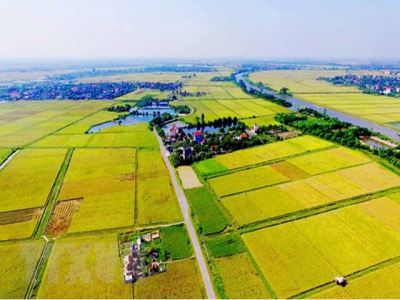Viet Nam needs policies to develop agricultural land market

HÀ NỘI — Việt Nam was in urgent need of policies to develop a transparent and sustainable agricultural land market to attract more investment in the farming sector, according to the Việt Nam Real Estate Association.
Paddy fields in NInh Giang District, Hải Dương Province. Việt Nam needs policies to develop a transparent and sustainable agricultural land market. — VNA/VNS Photo Phương Hoa
Đỗ Viết Chiến, the association’s general secretary, said at a conference on Thursday the definition of the agricultural land market in Việt Nam remained vague and lacked consistency, which was hindering agricultural development and discouraging investment in the sector.
“We need to introduce policies to build a transparent and consistent agricultural land market to fully exploit land resources,” Chiến said.
According to Trần Đình Thiên, former director of the Central Institute of Economics, Việt Nam was seeing an increasing number of large, modern firms in the agricultural sector, instead of individual farmers and farming households.
Thiên cited statistics that 2,750 new firms operating in agricultural production were founded in 2019, up by 25 per cent over the previous year, bringing the total number of agricultural firms to 12,600, or 1.8 per cent of the total.
Many invested in high-tech agriculture, such as Vinamilk, TH, Đồng Giao, Nafoods, Dabaco, Masan, Thaco, Lavifood, Ba Huân and Biển Đông.
Forming agricultural value chains also required large-scale land for production, Thiên said.
He said the sector was an advantage for Việt Nam, so it was necessary to develop the agricultural land market.
Policies should be developed to create favourable conditions for firms to invest in hi-tech agricultural production, Thiên said.
Lê Xuân Nghĩa, former chairman of the National Financial Supervisory Committee, said Việt Nam’s agricultural land market lacked transparency and stability.
Nghĩa pointed out that unclear land planning, coupled with rapid urbanisation which required the conversion of agricultural land into land for other purposes, often triggered speculation.
In addition, most transactions involving agricultural land were not conducted via brokerages, making the market less transparent.
Việt Nam did not have insurance policies for agricultural land ownership, Nghĩa said.
In Việt Nam, it's difficult for farmers to use agricultural land as a guarantee to borrow money from banks, reflecting that agricultural land is not regarded as an true asset.
Agricultural land transactions in Việt Nam are mainly between farmers or between farmers and enterprises.
Transactions between farmers and farmers are often small scale while transactions between farmers and enterprises are relatively unpopular because of a number of difficulties such as disagreements in land prices and unclear land ownership rights. .
Nghĩa said agricultural land should be recognised as an asset, which could be used for a mortgage. In addition, Việt Nam should have policies that insured ownership rights – an important factor to implementing transactions.
According to senior economic expert Cấn Văn Lực, Việt Nam should review the way it managed agricultural land with regard to the country’s food security strategy and rice export policy.
Price frames for agricultural land should also be adjusted to approach market value, Lực said, adding that the amount time permitted to exploit agricultural land should be extended from the current 50 years to 70 or even 99 years.
Enriching the national database on land in general and agricultural land in particular was also of critical importance to ensuring the effective management and exploitation of land resources, Lực said.
The country also needed to clear tax policies for agricultural land, he said. For example, tax breaks for agricultural land transactions should be offered to encourage the development of the market.
Most importantly, Việt Nam should encourage land accumulation, in which farmers contributed their land as a type of capital contribution, Lực said.
Agricultural land accounts for 39.5 per cent of the country’s total area.
Có thể bạn quan tâm
 Lychee export to Japan paves way for other Vietnamese fruits
Lychee export to Japan paves way for other Vietnamese fruits The Vietnamese lychees licensed to be exported to Japan is a good signal, showing that Vietnam's fruit products are able to conquer the most demanding markets.
 Rice sector eyes top quality varieties next year
Rice sector eyes top quality varieties next year Rice producers need to be more creative and increase quality if they want to see export profits rise next year.
 Tây Ninh promotes safe agricultural products, foodstuff in HCM City
Tây Ninh promotes safe agricultural products, foodstuff in HCM City Safe agricultural products and foodstuff from Tây Ninh Province are on display during a promotion week for the province's goods at the Big C An Lạc supermarket